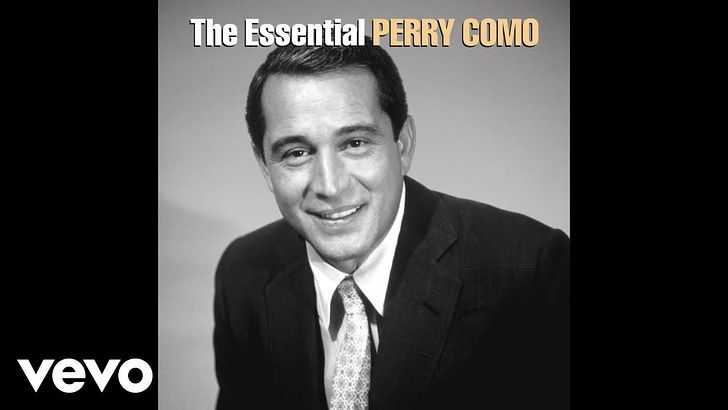Music video by Perry Como performing Catch a Falling Star (Audio). (C) 2017 RCA Records, a division of Sony Music Entertainment
Come in the middle? Here’re links to ➡️ Chapter One, Chapter 2, Chapter 3, Chapter 4, Chapter 5, Chapter 6, Chapter 7, Chapter 8
Catch a Falling Star
I have a note on the poem “Song,” quoting my professor Andrew Bongiorno (1900-98) at Oberlin where I got my first master’s degree and where I met Tom: “cynical poem although jaunty and vigorous” (or perhaps this is my note as it is not in red pencil, the color I used during class, but I don’t speak this way).
Therefore, it must be Bongiorno. Bongiorno, I learned long after I worshipped him, began teaching without the PhD he later earned. He would never be hired now by Oberlin where he remains revered. I learn of the PhD elsewhere (Cornell, 1935). Here’s what I read after Bongiorno had died, written by his godchild Andrew Ward who tells of urging Bongiorno to accept an honorary degree, “I told him that he owed it not only to himself and the students who revered him, but to the endangered vocation of teaching itself. It would at least throw a wrench into the new Oberlin that would never have hired Andrew, let alone given him tenure, because he tended to teach rather than publish and lacked a PhD.”
Bongiorno taught me that “we must be literal-minded because no poem can be completely our own as long as we are ignorant or even uncertain of the denotation of a single word in any line, of a single common or proper noun.”
Answer true or false. This imperative serves facts such as, Pluto is a planet. Oh, once good, no longer good. Answer true or false: D. has betrayed.
I refuse to answer.
Here is the poem by John Donne,
Song
Go and catch a falling star,
Get with child a mandrake root,
Tell me where all past years are,
Or who cleft the devil’s foot,
Teach me to hear mermaids singing,
Or to keep off envy’s stinging,
And find
What wind
Serves to advance an honest mind.
If thou be’st born to strange sights.
Things invisible to see,
Ride ten thousand days and nights,
Till age snow white hairs on thee,
Thou, when thou return’st, wilt tell me
All strange wonders that befell thee,
And swear
Nowhere
Lives a woman true and fair.
If thou find’st one, let me know;
Such a pilgimage were sweet.
Yet do not; I would not go,
Though at next door we might meet.
Though she were true when you met her,
And last till you write your letter,
Yet she will
Will be
False, ere I come, to two or three.
I spent more nights than I can count in the library with the Oxford English Dictionary—that I now own—to read the poems Bongiorno assigned, to find the meaning of a word in the year Donne wrote it. At the side of the OED I fell in love with a man named Tom who was in my class. I can no longer recall his last name.
Parapraxes?*
Here is what happened: We attended Bongiorno’s class. We went to lunch together. We studied together in the library, passing the OED to one another.
I lived in the Quadrangle because I was a graduate student and had an apartment there. He came back with me and we lay on the floor, making out, coming close to sex. I was a virgin. He did not know this. (I turned twenty-one; Tom took me off-campus—Oberlin was dry in the '60s—for my first drink: an apricot brandy sour). He refused to go further than the kissing and touching and clinging, a restraint that strikes me now as romantic and erotic like a good dream.
One night when I was alone in my apartment: A knock on the door. This was the sound of the inevitable: A woman stood before me. She said, “I am engaged to Tom _____.”
The Bongiorno class was over. I never saw Tom again. I wept. I ached. I suppose he married her. After all, he was Catholic and I, Jewish. Verbotten in the first place.
I loved Andrew Bongiorno’s class and have never forgotten his name. I loved Tom and have forgotten his surname.
My first husband danced with his secretary all night at a Christmas party while her husband and I watched. Some six months before he had told me at a lunch in a noisy restaurant near his office that he had been dreaming of her. Her name was Mary.
I am not making this up.
While I was crying, he had a side-table meeting with a business associate. He later told me that he had done much more with Mary than see her in his sleep. I asked, “Why are you telling me?” He answered, “Because it’s over.” Six months later when he ordered the tent and camping equipment for her for Christmas, when I was buying his other two secretaries their gifts: small vases or whatnots under thirty bucks, I asked for an explanation. He confessed. I tried to forget.
No parapraxes on this one.
He had built me a house with the kitchen of my dreams that my mother helped design and he kept the house when we divorced: Non-negotiable. I did not have it appraised. He told me what it was worth. He did not marry his secretary, but he did remarry: a lovely woman I now am quite fond of.
Could I have guessed that my second husband would build me a chef’s kitchen and then kiss two women over two years in front of me?
While my second new kitchen was being built I went to the hospital for a knee repair.
On the day of the surgery at Sibley Hospital in D.C., not far from the old house with its four stories and the empty kitchen that D. and I were renovating, I went to sleep.
No one dreams under general anesthesia. Out cold. But if I had dreamt, I would have dreamt of j., the man I met on the number five bus. That was after I’d left my first brand new kitchen—before the electrician had hooked up the new GE oven, built-in microwave under the hood—and my first husband who’d been having the affair.
I left this man I’d called “my husband” for the last ten years and who now seemed like anything but. I couldn’t even say his name out loud anymore. He’d become a nameless fixture in my life and in the house he’d built for us with a big wide kitchen, almost finished, with brand new fixtures for everything, many of which I also couldn’t name. I’d picked out knobs and buttons and switches and faucets, all with names and order numbers that had to be remembered or who knows what would have happened?
That new house was like none I’d ever seen or ever hoped for. In the kitchen, the trash can was hidden behind a cabinet and conveniently tipped forward when I pulled on the door. I had a hidden ironing board. Not that that had much to do with cooking, but the laundry room was right off the mud room, off the kitchen, near the back stairway. A back stairway! That new kitchen had a fireplace too and the all-important suburban deck.
I grew up in a Baltimore row house with stairs to the second floor and stairs to the basement and a view from the front door to the back door and the clothes tree outside the door. My childhood house didn’t have hallways or a foyer. There was no place to hide anything or to hide. I could hear the neighbors when they argued and everything that everyone said inside my narrow house was fair game for anyone in the back, the front, up or down the stairs.
After I left my first husband, I lived with my two children in a tiny house about the size of the kitchen in the new house he’d built and insisted was his. And I began riding the number five bus to the job I’d found in downtown D.C.
On that bus I met j. I’d been looking at him for weeks and didn’t know if he’d been looking at me because it seemed that everyone was looking at me when I dragged my three bags onto the bus each morning—my briefcase, my purse, my gym bag—and invariably dropped one of them. One morning, he retrieved my purse, handed it to me. And I met his eyes, so brown, so intense that in that brief moment of eye contact I felt as if I were traveling so fast I might die. I’d heard that if you could travel at the speed of light, you’d become light itself. Like matter changing into energy. I could barely look at him.
One day, standing at the subway after the bus ride, he’d spoken to me and somehow I’d given him my first name and apparently enough information to find me at my job because that’s exactly what he did. He called and asked me to lunch. I was seduced by the force of his effort.
At lunch, I had even more trouble looking at him, trouble not touching his long thin fingers, the silver rope bracelet on his wrist. I did slip one finger beneath the bracelet on parting and to my horror nearly swooned like an ingénue in a Victorian novel.
He calls. He pursues.
After I sleep with him at lunchtime at the Tabard Inn on N street, against my better judgment and with an unrestrained excitement I’d never known and would never know again, I also learn that he is married.
I would have dreamt all this because kitchens and men and new men and old ones and getting old and needing repair, and Viking stoves, and big-chested refrigerators are all about love despite what your stomach tells you. I knew this the way I knew that my kitchen was going, going, gone because I think somewhere deep down I knew that D. didn’t love me anymore.
From “Indifferent,” by John Donne. Read indifferent here as the OED suggests at the date of this poem as impartial.
Will no other vice content you?
Will it not serve your turn to do as your mothers?
Or have you all old vices spent, and now would find out others?
Or doth a fear that men are true torment you?
Oh, we are not; be not you so;
Let me, and do you, twenty know.
Rob me, but bind me not, and let me go.
Bongiorno continues to advise, “The search for literal meanings need not be regarded as a necessary evil. Its aim is the discovery of a large part of the poem’s significance, and the lover of poetry must overcome every tendency to find it irksome. The teacher who recognizes the value of this literal-mindedness not only will teach the student how to read a lyric, but will teach him, at least implicitly, that the rational and the imaginative are not contraries but complements, that the loftiest, no less the humblest, productions of the human spirit owe their being to man’s reason as well as to his imagination.”
Answer true or false:
Betrayal equals Mary.
Mary equals betrayal.
Therefore, Mary has not been betrayed.
Or go and catch a falling star.
*Parapraxes: "forgetting, Vergessen," according to Freud; OED 1935; see Freud's Introductory Lectures on Psychoanalysis.
Coming next: Chapter 10: “Bliss” Table of Contents
Love,











Mary, Mary, the lives we lead. This just keeps getting better, the revelations well paced, the ironies, shall we say piquant? The use of Donne, and the selections, is superb. What's your relationship to kitchens now?
This gives new life to "literal meanings." The paragraph beginning: Bongiorno continues to advise ... is so poignant and has stuck. It's wonderful how you have blended Bongiorno's teachings with your own experience. I am going to look up more on Andrew Bongiorno. Thanks, Mary.